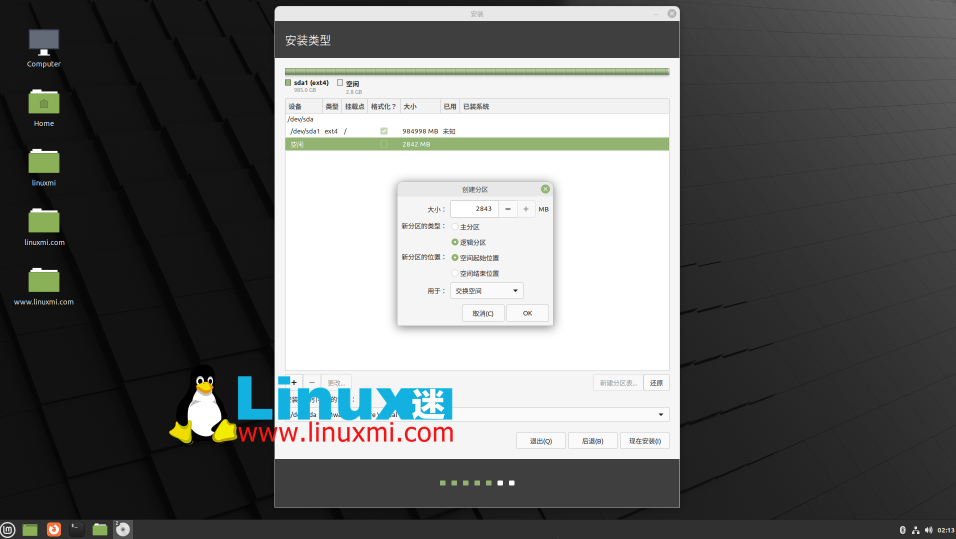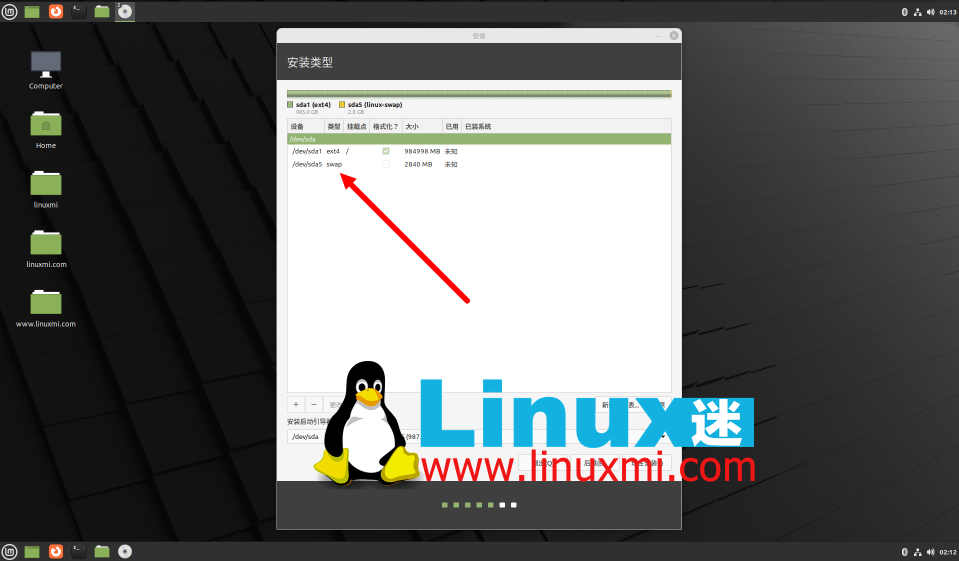Learn more about Linux swap and improve your system performance
In the Linux operating system, swap is a very important concept. It can provide additional memory space for the system and improve the performance and stability of the system. However, for many novices, swap may still be a relatively unfamiliar concept and they do not know how to configure and manage it. In this article, we will have an in-depth understanding of Linux swap, so that you can better configure and manage the system's swap space and improve the performance and stability of the system.
If you finally decide to switch from Windows to Linux. About halfway through the installation process, you will see the term "Linux Swap" and if you want to know what it is, then check out this article. Let’s see what swap space is in Linux and whether it is essential.
What is Swap in Linux?
Swap is similar to the memory expansion feature on smartphones that some manufacturers have recently offered. In short, it uses the phone's internal storage (like RAM) if there's not enough actual RAM space. Likewise, on Linux, swap space prevents your computer from crashing if your physical RAM is full by storing volatile data on its internal storage (HDD/SSD).
Creating swap space is not necessary for installing Linux, but if your computer has less RAM and more storage space, you can save some to make some swap space, as it is in some cases Might come in handy.
How much space is created for swap?
So, if your computer has the features we mentioned above, creating swap space is not bad, but the question is, how much should you create?
There is of course no limit to how much swap you can create, but common wisdom is "half the memory size". However, only create swap if you're sure you'll be running memory-intensive programs and doing a lot of multitasking, otherwise you'll actually be wasting storage space that you could be using to store other things.
How to create swap in Linux?
Considering that you are already in the installer and have created the / and /home partitions, the next step will be to create swap space. All you need to do is create an empty partition of a size that depends on how much RAM you have (if you have 8GB of RAM, you'll need at least 2GB to 4GB of swap space). In the options, select "Use this as exchange" or any exchange-related word and click Create. You can then proceed with the installation process.


Do you have a swap partition installed in your Linux? Let us know in the comments section below.
Through the introduction of this article, I believe you have a deeper understanding of Linux swap and know how to configure and manage it. In the process of using a Linux system, swap is a very important concept. It can provide additional memory space for the system and improve the performance and stability of the system. Therefore, don’t ignore the importance of swap. Properly configuring and managing swap space will bring significant performance improvements to your system.
The above is the detailed content of Learn more about Linux swap and improve your system performance. For more information, please follow other related articles on the PHP Chinese website!

Hot AI Tools

Undresser.AI Undress
AI-powered app for creating realistic nude photos

AI Clothes Remover
Online AI tool for removing clothes from photos.

Undress AI Tool
Undress images for free

Clothoff.io
AI clothes remover

Video Face Swap
Swap faces in any video effortlessly with our completely free AI face swap tool!

Hot Article

Hot Tools

Notepad++7.3.1
Easy-to-use and free code editor

SublimeText3 Chinese version
Chinese version, very easy to use

Zend Studio 13.0.1
Powerful PHP integrated development environment

Dreamweaver CS6
Visual web development tools

SublimeText3 Mac version
God-level code editing software (SublimeText3)

Hot Topics
 1660
1660
 14
14
 1416
1416
 52
52
 1310
1310
 25
25
 1260
1260
 29
29
 1233
1233
 24
24
 Linux Architecture: Unveiling the 5 Basic Components
Apr 20, 2025 am 12:04 AM
Linux Architecture: Unveiling the 5 Basic Components
Apr 20, 2025 am 12:04 AM
The five basic components of the Linux system are: 1. Kernel, 2. System library, 3. System utilities, 4. Graphical user interface, 5. Applications. The kernel manages hardware resources, the system library provides precompiled functions, system utilities are used for system management, the GUI provides visual interaction, and applications use these components to implement functions.
 vscode terminal usage tutorial
Apr 15, 2025 pm 10:09 PM
vscode terminal usage tutorial
Apr 15, 2025 pm 10:09 PM
vscode built-in terminal is a development tool that allows running commands and scripts within the editor to simplify the development process. How to use vscode terminal: Open the terminal with the shortcut key (Ctrl/Cmd). Enter a command or run the script. Use hotkeys (such as Ctrl L to clear the terminal). Change the working directory (such as the cd command). Advanced features include debug mode, automatic code snippet completion, and interactive command history.
 How to check the warehouse address of git
Apr 17, 2025 pm 01:54 PM
How to check the warehouse address of git
Apr 17, 2025 pm 01:54 PM
To view the Git repository address, perform the following steps: 1. Open the command line and navigate to the repository directory; 2. Run the "git remote -v" command; 3. View the repository name in the output and its corresponding address.
 vscode Previous Next Shortcut Key
Apr 15, 2025 pm 10:51 PM
vscode Previous Next Shortcut Key
Apr 15, 2025 pm 10:51 PM
VS Code One-step/Next step shortcut key usage: One-step (backward): Windows/Linux: Ctrl ←; macOS: Cmd ←Next step (forward): Windows/Linux: Ctrl →; macOS: Cmd →
 What is the main purpose of Linux?
Apr 16, 2025 am 12:19 AM
What is the main purpose of Linux?
Apr 16, 2025 am 12:19 AM
The main uses of Linux include: 1. Server operating system, 2. Embedded system, 3. Desktop operating system, 4. Development and testing environment. Linux excels in these areas, providing stability, security and efficient development tools.
 How to run sublime after writing the code
Apr 16, 2025 am 08:51 AM
How to run sublime after writing the code
Apr 16, 2025 am 08:51 AM
There are six ways to run code in Sublime: through hotkeys, menus, build systems, command lines, set default build systems, and custom build commands, and run individual files/projects by right-clicking on projects/files. The build system availability depends on the installation of Sublime Text.
 How to run java code in notepad
Apr 16, 2025 pm 07:39 PM
How to run java code in notepad
Apr 16, 2025 pm 07:39 PM
Although Notepad cannot run Java code directly, it can be achieved by using other tools: using the command line compiler (javac) to generate a bytecode file (filename.class). Use the Java interpreter (java) to interpret bytecode, execute the code, and output the result.
 laravel installation code
Apr 18, 2025 pm 12:30 PM
laravel installation code
Apr 18, 2025 pm 12:30 PM
To install Laravel, follow these steps in sequence: Install Composer (for macOS/Linux and Windows) Install Laravel Installer Create a new project Start Service Access Application (URL: http://127.0.0.1:8000) Set up the database connection (if required)




